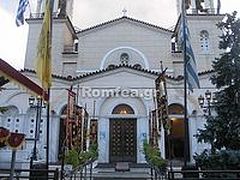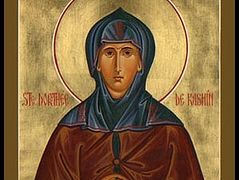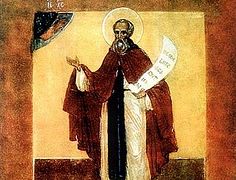Commemorated 12/25 October and the first Sunday after 25 January (Feast of the New Martyrs and Confessors of Russia)
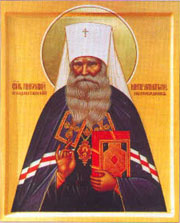 Icon of St. Nicholas, New Confessor of Alma-Ata.
Icon of St. Nicholas, New Confessor of Alma-Ata. “Our father was strict,” Vladyka recalls. “He was very demanding about order, and the fulfillment of work he would give us.” He was a great expert on Church hymns. He was especially careful about congregational singing, and instilled this love into his children. Nicholas remembered about his mother, “Mama was love itself. She never shouted at us, and if we did something wrong, which of course did happen, she would look at us so pitifully that we would feel terribly ashamed.”
Theodosy’s grandmother, Pelagea, meant very much in Theodosy’s upbringing. “During the long winter nights, “Vladyka recalled, “Babushka would take us up onto the brick oven, and tell us endless stories about the holy pleasers of God.” Vladyka often also remembered his grandfather, who was a priest.
In 1904, Theodosy’s cherished dream came true. On the eve of the feast of St.Nicolas of Myra and Lycia, he received the monastic tonsure. Theodosy was given the name Nicholas.
In 1905, on the feast day of the patron saint of the St. Nilus of Stolbensk Monastery, monk Nicholas was ordained a hieromonk, and on October 9 of the same year, he was ordained a hieromonk.
Having studied for four years at the Lavra of St. Sergius of Radonezh, in 1911 Fr. Nicholas successfully graduated from the Moscow Theological Academy.
In October of 1919, in Chernigov, Archimandrite Nicholas was consecrated bishop of Starodubov, a vicariate of the Chernigov diocese. Bishop Nicholas’ service as a bishop then continued in the city of Holy Hierarch Theodosy of Chernigov, for whom Vladyka had great veneration.
In 1923, Vladyka Nicholas was appointed as bishop of Kashira, a vicariate of Tula diocese, where the situation was very difficult at that time. The renovationists had taken over a great majority of parishes. But Bishop Nicholas steadfastly fought against the enemies of Orthodoxy. The result of this struggle was Vladyka’s arrest, which happened on May 8, 1925.
Having spent over two years in prison and then freed, Vladyka Nicholas was appointed to the Orel cathedra. Vladyka served in Orel until his next arrest. Here is what he himself relates about that time: “On July 27, 1932, I was arrested and sent to Voronezh, where the investigation was carried out. There is nothing to say about the conditions there, because our country at that time was experiencing great want.
“When the investigation was coming to an end, the investigator and I parted with regret. He told me trustingly, ‘I am glad that I was able to bring you at least some benefit by my investigation, and that I was able to prove the truth of your testimony; this is of no small significance—now they will re-qualify your statute and give you no more than five years instead of ten.’ ‘For what are they giving me five years?’ came involuntarily from my lips. ‘For your popularity. People like you need to be isolated for a period of time so that people would forget your existence. You enjoy too great authority amongst the people, and your sermons mean too much to them. They follow you!’ I did not expect to hear this evaluation of my service from the lips of a representative of this department, but that is how it was. Lord! Glory to Thee! Glory to Thee, Lord! I, a sinner, have served Thee as I was able.
“That is all I could say from the joy that filled my heart. Now I am not afraid of any prison term.”
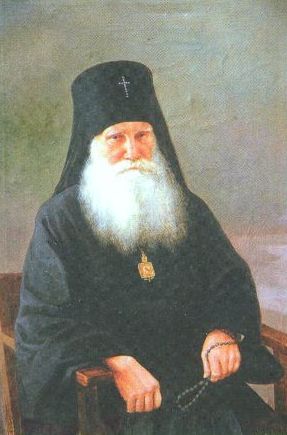
“I kissed all the windows and grates. At that time, St. Seraphim’s cell was still intact.
“The whole time I was in Sarov, I considered that I am in obedience to St. Seraphim, by whose prayer the Lord sends us such consolation in that we can serve the Liturgy and receive the Holy Mysteries of Christ.”
In 1941, Vladyka was raised to the rank of Archbishop.
News of the beginning of the Great Patriotic War reached Vladyka just before serving the Divine Liturgy.
“I served the Proskemedia,” recalls Vladyka, “When one of my friends told me in the quiet of the altar this terrible news. What could I say to the congregation, which was waiting in tears—not for consolation from me, but from Christ? I only repeated what Alexander Nevsky had once said: ‘God is not is strength, but in righteousness!’
“That year, the feast of all the Saints of the Russian land was celebrated on June 22. I think that this was especially significant. Because of our sins we had to endure a heavy trial, but the Saints of the Russian land did not abandon us with their intercessions. We turned to them, our countrymen, for help; and this heavenly help was manifested at a time when it was hard to expect it.”
After this news, Archbishop Nicholas was struck with a new trial—on June 27, 1941, Vladyka was arrested and sent to prison in the city of Saratov.
Having been in Saratov for about six months, Vladyka Nicholas was sent to Kazakhstan, to the city of Aktiubinsk, and three months later to the town of Chelkar, Aktiubinsk province.
When Vladyka was asked many years later, “How did you relate to this move? Wasn’t there any murmuring or hurt in his heart?” Vladyka answered, “God’s will is in everything. It means that I had to endure this difficult trial, which ended in great spiritual joy.
“Just think what would happen to a man if he were to spend his whole life in contentment and pleasure, surrounded by his friends and relatives? A life sated with earthly blessings leads to a hardened heart, and to coolness of love toward God and neighbor. From excess a man becomes cruel, not understanding other peoples’ grief or troubles.”
Vladyka was sent to free exile, but in a penal train car. The train came at night into the Cheklar station. The guards pushed Vladyka onto the platform in his undergarments and torn quilted jacket. He had in his hands only a certificate, which he was supposed to take twice a month to the local NKVD for their records.
Vladyka sat the rest of the night in the station. Morning came, and he had to go somewhere. But how could he go out in winter dressed as he was? And there was nowhere to go, anyway. Vladyka had to turn to some elderly ladies for help, and their kind female hearts responded. The ladies gave him a warm quilted suit, a cap, and a pair of patched felt boots. One gave him shelter in her barn, where her cows and pigs lived. Vladyka was in his sixty-fifth year at the time. His hair was gray, and his appearance evoked compassion. Vladyka tried to find work, but no one would hire him, for he looked older than he was. He had to take alms in order not to die from hunger. Later, when his spiritual children asked him, “Why didn’t you tell the old ladies who gave you clothing that you are a bishop?” Vladyka replied, “If the Lord sends a cross, He also gives strength to carry it, and He also makes it lighter. One must not assert one’s own will in such cases, but rather give himself over entirely to the will of God. It is not worthy of a Christian to go against the will of God; and after a person patiently endures the trials sent to him, the Lord sends spiritual joy.” This is how Vladyka ended his explanation.
Thus, until late autumn of 1942 did Vladyka drag out his pauper’s existence. His physical strength was fast waning. He became wasted from malnutrition and cold, his body was covered with sores, and he had lice from the dirty conditions. His strength was leaving him rapidly…
Then came the moment when Vladyka’s last strength failed him, and he lost consciousness. He awoke in a hospital, in a clean room, in a clean bed. It was bright and warm, and people were leaning over him. He closed his eyes, deciding that this was only his imagination. One of those leaning over him felt his pulse and said, “Well, almost normal! Our grandpa has come to!” Vladyka recovered slowly. When he finally rose from his bed, he immediately tried to be of help to those around him. He would bring water to some one, a dish to another, straighten another’s bed, give a kind word to yet another. People in the hospital came to love this kind old man. All began to call him affectionately, “Grandpa.” But only one young doctor knew this “grandpa’s” tragedy; he knew that when they release him from the hospital, he would again return to begging alms and living with the cows and pigs.
Then, the day arrived when the doctor was asked to release “grandpa” from the hospital. Vladyka Nicholas began to pray to the Lord, once again giving himself over to His will. “Wherever you send me, Lord, that is where I will go!” When everyone gathered to say good-bye to this kind “grandpa,” the nurse said, “Grandpa, they’ve come for you!” “Who has come?” everyone said at once. “That same Tatar who brought you packages—don’t you remember?” Of course, Vladyka could not forget how he was given a couple of Tatar flat cakes, a few eggs, and a few pieces of sugar regularly every ten days from an unknown Tatar. Vladyka also knew that it was that same Tatar who had picked him up, half alive and lying unconscious by the roadside, and taken him to the hospital.
Stunned, Vladyka went to the exit. There really was a Tatar standing there with a whip in his hands. “Well, hello, bachka!” he said to Vladyka, and smiled kind-heartedly. Vladyka also greeted him. He went outside and the Tatar seated him in his sledge, sat down himself, and headed off. This was the end of winter, 1943. “What made you decide to take part in my life and have such mercy toward me? After all, you don’t know me at all,” Vladyka asked. “We have to help each other,” answered the Tatar. “God told me that I have to help you, that I have to save your life.” “How did God tell you?” Vladyka asked him, amazed. I don’t know,” the Tatar replied. “When I went about my business, God said to me, “Take that old man; he has to be saved.”
A peaceful life began for Vladyka after this. The Tatar had connections and could arrange it so that Vladyka’s spiritual daughter, Vera Afanasievna Fomushkina was soon able to come to Chelkar. She had also been exiled, but to another region. Vera Afanasievna did not hide from others the identity of this “grandpa,” whom the people of Chelkar had so caringly nursed back to health.
On October 10, 1944, Vladyka himself sent a “fervent request,” to the People’s Commissar of Internal Affairs of the USSR, in which he asked them to remove his status of “free exile,” permit him to go to Russia, “and occupy a cathedra according to appointment by the Holy Synod.”
By decree of a Special Committee of the People’s Commissariat of Interior Affairs of the USSR, May 19, 1945, Vladyka Nicholas was freed on parole.
On July 5, 1945, the Holy Synod decreed the formation of an Alma-Ata and Kazakhstan diocese, and Archbishop Nicholas was appointed as its ruling hierarch.
Vladyka arrived in Alma-Ata on October 26, 1945, on the feast of the Iveron icon of the Mother of God.
Having arrived in Alma-Ata, Vladyka Nicholas began serving in the small Kazan Church, located away from the center of town, and which had been re-opened just a few months before his arrival.
Vladyka had an unusual zeal for Divine services, which he celebrated with the maximum closeness to monastic services that could be had in a parish. He always served reverently, and never rushed. If the choir would try to rush the services when Vladyka served, he would immediately look out of the altar and ask, “Who here needs to catch a train?” Everyone would be embarrassed, and the choir would slow down. Once, Vladyka came to the cathedral at six-thirty in the evening, and the service, which began at six o’clock, was nearly over. Vladyka said, “Let’s start from the beginning; it’s not right to treat the Divine services so negligently. Then they began the evening services all over. Vladyka stood on the cliros and sang.
That is how Vladyka began his service as a hierarch in the Kazakh land, far from his beloved Russia.
Vladyka was in his seventieth year at that time. Not only did he demand strict fulfillment of the rule, he always explained the meaning of the services, why they needed to sing or read one thing, and not another. Vladyka prayed with tears, especially when he served the Divine Liturgy; when they sang “We praise Thee, we bless Thee…” he always wept. He said that he weeps for joy that the Lord has vouchsafed him to serve this Liturgy, and from the happiness that he can pray for all of his spiritual children, and all his flock. He often asked his flock, “Well, I teach you, my friends. You see that I am an old man. After all, the Lord will hold me responsible for you. But you forget my words, you do not remember them, and do not strive to fulfill them. I ask you to remember my words, and do as I teach you, my friends.”
A man of fervent prayer, Vladyka especially loved and venerated the Mother of God. To his flock’s great consolation, Vladyka served the burial service of the Mother of God on the feast of the Dormition for the first time in Alma-Ata. Whenever someone had some misfortune or fell sick, Vladyka would first of all counsel them to confess as strictly as possible, receive Communion, and only after that should they try to correct the situation they found themselves in or get medical treatment. “Impure confession is the root of our problems. Why? Because the Lord wants all to be saved, and so He saves us through all kinds of misfortunes. We only remember God during misfortunes; but we forget Him in times of prosperity.”
During the days of Holy Pascha and the Nativity of Christ, the doors of Vladyka’s house were never closed. All would greet each other with the Paschal kiss; all would glorify the Lord. “On Pascha,” one choir member remembers, “after services in the church we went home to Vladyka to congratulate him with the feast. We would sing the entire Pascha, but he wanted more. He would ask us, ‘Let’s sing some more… After all, what joy we have!’ Vladyka would rejoice like a little child on that great Feast. On the Nativity, we would go to glorify Christ with Him. He would pass out gifts. We were so joyful that our Vladyka was so gracious, so radiant, like a clear sun. Every little wrinkle on his face shone.”
The holy hierarch Nicholas of Alma-Ata would often say, “My friends, don’t forget me, a sinner, in your prayers, now and after my death. I do not forget you, and I will never forget you. If I obtain boldness, if only the Lord would receive me under His protection, if He forgives and has mercy on me, I will pray for you even after my passing into another life.”
After every Liturgy, Vladyka would stand on the ambo and bless each person, regardless of the fact that on Sundays and feast days there would be up to a thousand or more people in the church. “Vladyka,” his spiritual children would say, “isn’t it hard for you to bless for so long after the service? You should give a general blessing and then go home to rest.” “Eh, eh, you don’t know how much our Orthodox people love a hierarchical blessing and treasure it!” Vladyka answered, and, after a silent pause, continued, “Yes, sometimes I get so tired that I think, ‘I will give a general blessing.’ But then, after this thought comes another: ‘And what if the Lord should suddenly call me to Himself and ask me how I parted with my flock?’ This thought gives me strength, and I bless the people.” He loved everyone equally with a divine love, and this love poured out upon every person who met him.
Vladyka prayed at home with great fervor and tearful prayer in his quiet cell, having donned his simple monastic mantle in place of his hierarchical one. Mother Vera would hang a dry towel near the analogion every morning and evening, and she would take them away all wet, soaked with Vladyka’s tears.
In July of 1947, Vladyka had to fly to Moscow for a session of the Holy Synod.
While the airplane was landing, Vladyka stood by the gangway and blessed all the passengers boarding the airplane. Vladyka always flew in his ryassa, even though he was often mocked for this.
This time also, the passengers noticed that a religious personage was blessing them and began to laugh, biting remarks raining down: “Well, we needn’t fear—a saint is flying with us!” Practically none of the passengers said a kind word. “But I didn’t hear them,” Vladyka related, “I pitied them. After all, people don’t even suspect that they are not speaking blasphemies from their own minds and understanding, but are only fulfilling the evil will of the enemy of the human race. I calmly blessed them all.”
Everyone was seated, and the airplane took off. Some time passed, and suddenly the pilots started to worry. Finally, the senior pilot announced that there was danger—one of the motors had stopped working. The situation was threatening, and catastrophe was impending. The passengers began to panic. But Vladyka said, “Let’s pray! Not a single soul will perish!” and then added, “We will only get a little dirty in the mud.” Vladyka stood up and began to pray. The passengers’ anxiety did not decrease. No one paid any attention to Vladyka, but in a few minutes all began to calm down, rise from their seats, and listen to his prayer. He was praying to the Lord to save everyone who was flying in that plane. Then the airplane began to fall. But to the amazement of the pilots, who knew how an airplane should fall, its descent was unusual—it as if glided and gently lowered down. The airplane fell into some swampy but small, shallow lake. When the people had recovered a little from their fear, they started coming up to Vladyka to thank him. Even the senior pilot came to him and said, “A miracle happened, father. Forgive us for our mockery!” “God forgive you,” Vladyka answered. “Thank God and His Most Pure Mother, and place your hope in St. Nicholas.”
One visit to the city of Uralsk was deeply impressed in the memory of the senior subdeacon, Arius Ivanovich Bataev. “It was a summer in the early 1950’s,” he recalls. “Vladyka was serving in the Archangel Michael Cathedral in the city of Uralsk. After the service he began to talk with the faithful. The people complained to Vladyka about the heat wave and drought in the Uralsk region, for from the time the snow melted, not a drop of rain had fallen.
Vladyka said, “Let’s pray to the Heavenly King; perhaps he will hear our prayer.” They began to serve the moleben for rain. Then a miracle happened—the sky, which did not have a single cloud, darkened, became covered in thick rain clouds and it not only rained, it poured, as if a bucket of water had spilled out. The walls of the old Uralsk cathedral trembled from the thunderclaps. Vladyka paused in his prayer and said, “Orthodox people! Isn’t this a miracle?!”
When they finished the moleben and waited for the end of the downpour, all went outside and breathed in the fresh, clean air. Vladyka had to walk 200 meters from the church to the rector’s house, but after the downpour the dusty road had become a mud slide. Then the people, filled with love and gratefulness to Vladyka, immediately paved the way with their own clothing.”
From the recollections of Archpriest Valery Zakharov, rector of the St. Nicholas Cathedral of Alma-Ata:
“In the seventies, Metropolitan Joseph (Chernov) of Alma-Ata and Kazakhstan said these words in his sermon: ‘We Alma-Atans live in the foothills of the Tien Shen mountains. On the one hand, we are fortunate to have such beautiful mountains, but on the other hand, the mountains conceal a danger of earthquake and destructive landslides. But Alma-Ata will never be swept away by landslides or destroyed by earthquakes, because we have remarkable intercessors in Metropolitan Nicholas and Schema-Archimadrite Sebastian.’ Vladyka Joseph would say that, and I remember it precisely.”
From the recollections of Valentina Pavlovna Shitailova, from the town of Elets:
“Vladyka would often stand on the cliros with us; he loved to sing the early Liturgy with the left choir. He himself would give the tone. He had a velvety baritone, very soft and beautiful. When Vladyka sang, he would penetrate the soul with his singing. Especially during Great Lent—he would come out to the cathedra and sing, “I see Thy bridal chamber, adorned, O my Savior…” He sang soulfully, longingly. His voice poured over the church, there was a sepulchral silence; you could only hear the tinkling of the censor’s bells, and the weeping of the people.
“And Vladyka himself always wept. You could especially see his tears on the velvet Lenten vestments in the evening electric light, sparkling like pearl threads on his sakkos. But what is remarkable—if we were to cry, we could not sing or read. But Vladyka wept and made pronouncements in a clear voice.”
From the recollections of Maria Alexeyevna Petrenko, Alma-Ata:
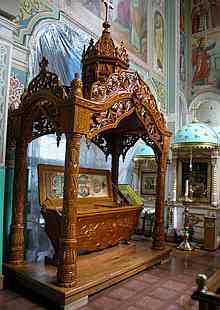 The reliquary in the St. Nicholas Cathedra, Alma-Ata.
The reliquary in the St. Nicholas Cathedra, Alma-Ata. “I learned who Vladyka was and where he lived. After work, a six o’clock in the evening, I came to the gate of house number 45, Cavalier Street. An elderly woman opened the door, and asked why I had come. I said that I wanted to tell Vladyka about myself.
“When I saw Vladyka, I began to quake; I felt that I could not say a single word. ‘Hello,’ was all I could squeeze out. ‘Calm down, my child,’ Vladyka said lovingly. He patted my head, sat me upon a chair, and asked the woman to bring me some water. When I began to drink the water, my teeth clattered against the glass. ‘Please, calm down, don’t cry, you should have come long ago,’ I heard again the elder’s loving voice.
“When I had calmed down a little, I began to speak… I told him about my life, my illness, and about the terrible thing I was contemplating. ‘Well, and glory be to God!’ he said. “Well, and it is good that you simply came to me!’ After my story, Vladyka explained to me what a great sin it was to commit suicide. ‘No matter how hard it gets, one must never cut off one’s own life. You have to turn to the Lord in prayer, and He will always ease the cross given to you.’ Then he arose and gave glory to God: ‘Glory to Thee, Lord, glory to Thee for all things unto the ages!’ I stayed with Vladyka until ten o’clock in the evening. It was hard for me to believe that it was all happening to me. I felt so joyful and light! Yes, I felt that truly, God is with us!”
From the recollections of Valentina Danilovna Ereminaya, Alma-Ata:
“During his final years, Vladyka was often sick, but he tried to be in church even then. At times Mother Vera would ask him, ‘Vladyka, stay home. You are so ill!’ He would reply, ‘I will be healed in the church. But at home, I will get even sicker.’ Wishing to prolong Vladyka’s life, the doctors advised him to have a change of climate, in hopes that this would support his health. But Vladyka could feel the inevitability of death, and he refused to move, saying, ‘Everyone loves me so here, and I want to die in the arms of my [spiritual] children.’
“Vladyka’s prayerful mood did not abandon him throughout the days of his illness. On Sunday, October 23, after receiving the Holy Mysteries of Christ, when the nuns in the refectory were singing, ‘The pre-eternal counsel...,” Vladyka shouted to them from his bedroom, straining his voice, ‘Mothers, mothers, we’ll end it there. Now we will begin the burial rite of a bishop.’ They stopped singing, but they could not hold back their tears.
“Vladyka prayed especially loudly and intensely on the night of the October 23–24. We could hear the words, ‘Lord, condemn me not according to my deeds, but do until me according to Thy mercy!’ He repeated many times with deep feeling, ‘Lord! I ask mercy, and not judgment!” On Monday, October 24, the eve of his death, Vladyka spoke a little more. He said something with special affection to each of us, as if saying good-bye. At around five o’clock in the evening he had a heart attack with sharp pain, after which he no longer spoke, and lay with his eyes closed.
“On Tuesday morning he found the strength to cross himself several times as they sang the akathist to Great Martyr Barbara.
“By five o’clock on October 25, those around him could see his approaching end. They began to read the prayers at the departure of the soul, placed a burning candle in Vladyka’s hand, and with the last words of the canon for the departure of the soul, Vladyka quietly and peacefully breathed his last. This was at 4:45 p.m., when they bells of the St. Nicholas cathedral were ringing for evening service for the feast of the Iveron icon of the Mother of God, to Whom Vladyka so loved to sing, ‘Rejoice, O Keeper of the gates, Who opens the doors to paradise to the faithful!’” Thus, as he came to his Alma-Ata cathedra on the feast of the Iveron Mother of God, so he did depart from it to the Lord on that same feast day.

